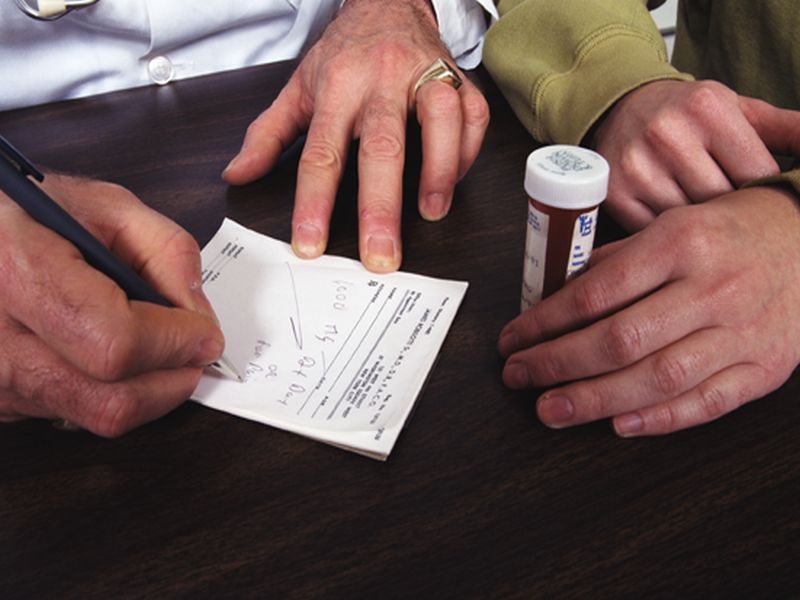TUESDAY, June 6, 2017 (HealthDay News) — Cancer doctors who receive freebies from pharmaceutical companies are more likely to prescribe drugs produced by those companies, a new study reports.
Free meals, paid travel expenses and fees for consulting or lecturing appeared to influence which drugs a doctor would choose when treating two different types of cancer, said study lead researcher Dr. Aaron Mitchell.
Specifically, doctors were 78 percent more likely to prescribe a drug to treat kidney cancer that had spread if they’d received a gift or small payment from that drug’s manufacturer, compared to physicians who didn’t receive any payments, Mitchell said.
The doctors also were 29 percent more likely to prescribe a drug for chronic myeloid leukemia if they’d received meals, travel or speaking fees from the drug’s maker, Mitchell said.
“This raises the possibility that drug companies are able to influence prescribing practices through gifts to physicians,” he said.
Mitchell is a fellow with the University of North Carolina School of Medicine.
Dr. Richard Schilsky, chief medical officer of the American Society of Clinical Oncology (ASCO), was not surprised by the findings.
“This is why drug companies do what they do,” Schilsky said, adding that he hopes the findings will “raise awareness among doctors that they are susceptible to these influences.”
Previous research has indicated that drug company gifts can influence doctors to choose pricey brand-name drugs over cheaper generics, Mitchell said during his Saturday presentation of the study.
Mitchell and his colleagues decided to see if such influence occurred in cancer treatment, where the stakes can be higher.
“The drugs we use are far more toxic and far more expensive to our patients, and hence any decision between different drugs takes on greater weight,” Mitchell said.
The researchers chose to focus on kidney cancer and chronic myeloid leukemia because doctors can choose between one of three different drugs to treat these cancers, Mitchell said.
The drugs work equally well, but have differences in side effects that would be noticeable to a patient, Mitchell said.
The research team reviewed data from the U.S. Center for Medicare & Medicaid Services to track individual cancer doctors’ prescribing patterns in 2013 and 2014 for those diseases.
They then compared those prescribing patterns against data from Open Payments, a database created under the Affordable Care Act through which drug and medical device manufacturers must disclose any payments greater than $10 to doctors or teaching hospitals.
The researchers found almost 1,400 doctors who had received payments and prescribed cancer drugs, and about 800 doctors who had prescribed cancer medications but hadn’t received any payments.
It turned out the payments did appear to influence doctors’ choice of drug, even though the payouts tended to be small. Payments were about $566, on average, per doctor from kidney cancer drug makers, and $166 from makers of drugs to treat chronic myeloid leukemia, the study authors said.
“Even for physicians who received very small payments, we still saw a change in prescription rates,” Mitchell said. “It looks like this shakes out to be a really good buy for a drug company.”
Interestingly, the researchers found mixed results when they looked at direct research funding that doctors received from drug makers.
Research funding appeared to influence drug choice for treatment of kidney cancer, but not chronic myeloid leukemia, the researchers found. However, average research funding provided for kidney cancer per doctor (about $33,000) was far less than that for leukemia (almost $186,000).
Dr. Dawn Hershman leads the breast cancer program at Columbia University’s Herbert Irving Comprehensive Cancer Center in New York City. She said it would make sense that research dollars could influence drug choice.
“If you’ve used a medication in a clinical trial and you have three different agents you can choose from, you have a tendency to go to the agent you’re more comfortable with,” Hershman said.
By the same token, these smaller gifts — and the drug company interaction that accompanies them — might help a doctor feel more knowledgeable and comfortable with that company’s products than the other options at their disposal, Mitchell said.
Dr. Erin Aakhus, a cancer specialist with the University of Pennsylvania Perelman School of Medicine, said the new study results warrant further exploration to determine the extent of this influence.
“Financial conflicts of interests may contribute to oncologists’ drug selection,” Aakhus said. “The influence of the manufacturer on decision-making needs to be considered.”
Mitchell said doctors are likely to minimize the influence that small gifts would have on them.
“Physicians feel like everyone else would be influenced by this, but I wouldn’t be, personally,” he said.
Medical societies such as ASCO try to limit such influence by creating carefully vetted guidelines to help doctors impartially choose the right medication for each patient, Schilsky said.
Hershman said patients also can help by educating themselves on their different treatment options and being engaged in decision making.
“The biggest issue for patients is to be aware,” Hershman said. “When they are getting medication, ask their provider if there are other options. Ask the reason they’re prescribing that medication as opposed to others.”
The study findings were presented at the American Society of Clinical Oncology’s annual meeting, in Chicago. Findings presented at meetings are generally viewed as preliminary until they’ve been published in a peer-reviewed journal.
More information
To check out the Open Payments database, visit Centers for Medicare & Medicaid Services.
Copyright © 2026 HealthDay. All rights reserved.

